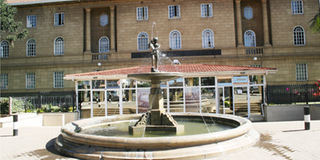Judges protest as new tax rule enforced

The High Court in Nairobi. Photo/FILE
Kenya’s 55 judges are up in arms against a decision by the Government to implement a proposal to tax their salaries and allowances before Parliament passes the law.
The High Court and Appelate judges are accusing the Government of ambushing them with the deductions, which were effected in their September pay.
A crisis meeting to discuss the issue is expected on Friday after their attempts to meet Head of Public Service Francis Muthaura on Tuesday failed.
Allowances
The move is part of tax proposals made by former Finance minister Amos Kimunya in his Budget Speech in June.
Mr Kimunya had proposed that MPs and holders of constitutional offices, whose allowances are not subject to taxation, pay tax like all Kenyans.
However, MPs who are still enjoying tax-free allowance are yet to feel the pinch as a decision on how much will be deducted is yet to be made.
Others who got a rude shock on receiving their September salaries include commissioners of the Electoral Commission and those of the Public Service Commission.
They surrendered huge sums of money to the tax man — approximately a third of their pay.
A judge who spoke to the Nation on condition of anonymity because of the sensitivity of the matter, said the decision is unfair and it had “disorganised” them.
“They didn’t even give us notice and we have bills to take pay; almost every judge has a mortgage to pay; now that means we have to start organising ourselves again from scratch,” the judge said.
Even if the law had been amended, the judge said, it could not be applied retroactively as they have been asked to pay tax from July.
What has been deducted so far is the September tax and they are expected to pay for July and August later. He said the move amounted to interference of the Judiciary’s independence.
On Thursday, MPs argued that Mr Kimunya’s proposal cannot be implemented until Parliament enacts the Finance Bill which contains amendments to change the law which frees their perks from taxation.
Sanctioned
A member of the House Committee on Finance, Trade and Industry Mr Jakoyo Midiwo, said deductions cannot be effected until sanctioned by MPs themselves in Parliament.
“We are going to scrutinise the contents of the Finance Bill in relation to the tax shortly before it goes to the House,” he said.
The Bill is expected to go to the House any time after MPs resume sittings on Tuesday from a recess.
Parliamentary authorities indicated yesterday that the 222 MPs might only be taxed after the enactment of the Bill because there were consultations between the Kenya Revenue Authority and Parliament on which allowances should remain untaxed.
Each of the 222 MPs earns more than Sh800,000 a month, out of which only Sh200,000 is taxed.
The rest of the money is tax exempt. If the law is changed, each MP would pay at least Sh233,931 in taxes a month in Pay-As-You-Earn based on the Sh800,000 package.
Their combined tax would contribute at least Sh51.9 million a month or Sh802.8 million a year to the Treasury.
Government spokesman Dr Alfred Mutua said the Treasury had sent instructions to the various ministries under which constitutional office holders fall asking them to effect the taxation measure on a PAYE mode.
“We have been doing this since this year’s budget was presented,” he said. Electoral Commission of Kenya vice-chairman Kihara Mutu confirmed that the taxation had been effected.
Following the deductions, judges parted with between Sh70,000 and Sh90,000 individually which was taken by the tax man.
A High Court judge normally earns Sh300,000 while their counterpart at the Appeal Court takes home Sh500,000.
This would mean that on a monthly basis the government will now collect approximately Sh3,150,000 from High Court judges and Sh900,000 from Court of Appeal ones.
The taxation move move came three months after Mr Kimunya’s proposal which also affects constitutional office holders such as judges, chief justice and the Attorney-General.
The Attorney General’s salary and allowances stand at Sh1.2 million a month. The Chief Justice and other judges’ salaries and allowances total Sh43 million a month and that of Controller and Auditor General is Sh672,836.
Those to be taxed also are ECK bosses and Kenya National Commission on Human Rights commissioners, among others.
The Public Service Commission chairman, deputy chairman and members’ salaries amount to Sh9 million monthly while the Electoral Commission of Kenya chairman, deputy chairman and members salaries stand at Sh9.6 million a month.
The Kenya National Commission on Human Rights commissioners pocket a total of Sh5.6 million a month. The law as it is protects the judges salaries from being altered.
Section 104(3) of the Constitution says that the terms of services of judges together with their remuneration cannot be altered to their disadvantage after their appointment.
Secondly section 5 of the constitutional office holders remuneration Act says that the allowances of constitutional officer holders should not be taxed.
MPs have in the past united in opposing plans to tax their salaries and allowances, saying most of their money was used in assisting their constituents.



